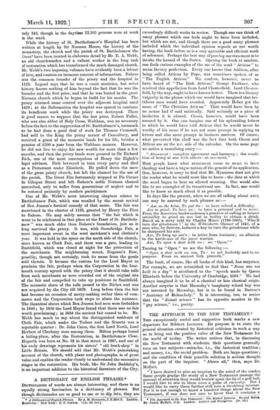A DICTIONARY OF ENGLISH PHRASES.* DIeromeAniss of words are always
interesting, and there is an equally strong fascination in a dictionary of phrases. But though dictionaries are so good to use or to dip into, they are
• A Dictionary of English Phrase.. By A. M. Hyamson, F.R.Bist.S. London Itontledge : New York : E. P. Dutton. 1124. dd. net.]
exceedingly difficult works to review. Though one can think of many phrases which one feels ought to have been included, but which are not, and though there are a good many phrases included which the individual opinion regards as not worth having, the book before us is a very agreeable and efficient work of reference. Perhaps the best way of proving our statement is to invoke the hazard of the Sortes. Opening the book at random, one finds curious examples of the use of the word " Atticus " to mean literary perfection. Every one knows that Addison, after being called Atticus by Pope, was sometimes spoken of as "The English Atticus." We confess, however, never to have heard of "The Irish Atticus," George Faulkner, who received this appellation from Lord Chesterfield. Lord Chester- field, by the way, ought to have known better. There is a literary vulgarity in the phrase which one would have imagined that fas- tidious man would have avoided. Apparently Heber got the
name of "The Christian Atticus." That would have been by no means bad if said satirically. Said seriously as a piece of
laudation it is absurd. Cicero, however, would have been amused by it. One can imagine one of his upbraiding letters in which he would have told Atticus that he would never be worthy of his name if he was not more prompt in replying to letters and also more prompt in business matters. Of course, what prevented this chaff was the fact that both Cicero and Atticus are on the s.c. side of the calendar. On the same page we notice a tantalising entry :—
" Atonement : complete agreement and harmony ; the condi- tion of being at one with others—at-one-mont."
Most people know what atonement came to mean in later theology and have a vague notion of the genesis of its application.
One, however, is sorry to find that Mr. Hyamson does not give the reader what he would most like to know—the date at which the word began to bear an altered meaning. One would also like to see examples of its transitional use. In fact, one would like to know as much about it as possible.
In days like the present, when we are all talking about axes, one may be amused by such phrases as :—
" Axe on the helve, To put the : to have solved a difficulty.
Axe to grind, To have an : to have a personal end to serve. From the American backwoodsmen's practice of calling at houses ostensibly to grind an axe but in reality to obtain a drink. Based on a story told by Charles Miner (1780-1865), 'Who'll turn the grindstone ? ' in the Wilkesbarre Gleaner of 1841, of a man who, by flattery, induced a boy to turn the grindstone while he sharpened his axe. Axe, To hang up one's : to retire from business ; an allusion to the battle-axe of the passi warrior.
Axe, To open a door with an : see ' Open.' "
Turning to " Open " we see the following :—
" Open a door with an axe, To: to act foolishly and to no purpose. From an ancient Grk. proverb."
The book, of course, like all books of this kind, has surprises. For example, we are astonished to find that "Rome was nol built in a day" is attributed to the "speech made by Queen Elizabeth before the University of Cambridge, 1564." We had always imagined it to be of a classical or late classical origin.
Another surprise is that Macaulay's imaginary school boy was not invented by Macaulay, but is to be found in Burton's "Anatomy of Melancholy." It is interesting, too, to notice
that the "dismal science" has its opposite number in the "gay science," i.e., poetry.


































 Previous page
Previous page